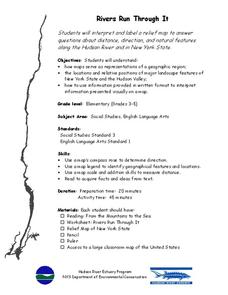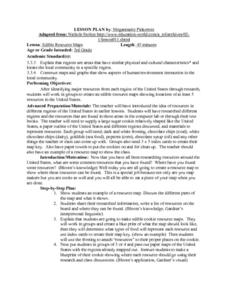Curated OER
Land Elevation
Young scholars investigate land elevation. In this map skills lesson, students use a physical map to identify various elevations of the land. Young scholars find landform features such hills and coastlines.
Curated OER
United States Map- Land Elevation
Pupils explore a physical map. In this map skills lesson, students discuss examples of elevation and investigate the symbols used to identify elevation on a map. Pupils use the map to identify various land elevations.
Curated OER
Rivers Run Through It
Using a relief map of New York State, learners answer questions about the distance between different cities, identify bodies of water, and more. First, they discuss vocabulary related to the Hudson River area. Then, they complete a...
Curated OER
Tooling Around Arizona: Reading Arizona Maps
Students study geography. In this Arizona maps lesson, students develop their map reading skills. They have class discussions and work independently with various copies of Arizona maps to practice those skills. This lesson mentions...
Curated OER
Sparta and Athens
Sixth graders study Ancient Greece. In this Ancient Greece lesson, 6th graders complete 16 lessons to learn about Ancient Greece. Students complete a quiz for assessment.
Curated OER
Cultural Exchange (Salem)
Students view the photo of the The Tea Trade Painting and discuss what they see. They will then discuss what went into the beginning of a major sea voyage. Next they explore routes traveled by the New England traders. They study sailing...
Curated OER
Papier Mache Globe
Students use newspapers and balloons to create a paper mache globe. They define areas of land and sea with geen and blue tempera paint, then define borders with markers.
Curated OER
Puerto Rico . . . Its Land, History, Culture, and Literature
Students examine Puerto Rico's location and from its geographic location, reflect on its culture and people. They also read a play by a Puerto Rican author. This is an excellent cross-curricular unit, including history, geography, and...
Curated OER
El Nino
Students explain what El Nino is, where it is located and how it is created. They describe the weather changes caused by El Nino. They draw the patterns of El Nino on a world map. They predict economic effects El Nino has on the areas it...
Curated OER
Aquatic Ecosystems
Students study the diversity of marine life and their habitats. In this aquatic ecosystems lesson students complete a lab activity and experiment.
Curated OER
Cultural Diversity In The Classroom
Students engage in a lesson that supports the fact that Asian people are part of the educational culture in schools. The lesson includes background information for the teacher. With the completion of the unit students develop a personal...
Curated OER
Southeast Asia And Globalization
Students investigate the area of Southeast Asia and how its economy has become the power that it is today. The concepts related to being a consumer are discussed. They go over how globalization has been introduced into Asia and helped...
Curated OER
Globalization: The Garment Industry in Southeast Asia
Students are introduced to the concept of globalization. In groups, they read primary source documents to view sweatshops from different points of view. They write a paper about the impact of globalization on the garment industry and...
Curated OER
The Middle East: Land of Contrasts
Students explore the ancient city of Petra. In this Middle East lesson, students watch "The Royal Tour of Jordan," and then discuss the history of Petra. Students conduct research on selected sites in the city and use their findings to...
Curated OER
Recycle, Reduce, Reuse and Save a Tree
Young scholars examine how to save and protect trees. For this conservation lesson, students read books about the usefulness of trees, write ideas in their journals about how trees can be used, and make a book of ways to protect trees.
Curated OER
Renaissance Trade and Exchange
Sixth graders map out trade routes. In this Renaissance time period lesson, 6th graders complete a Christopher Columbus Map Activity, discuss and identify the parts of a map, and locate Asia, Europe and the Middle East. Students...
Curated OER
Edible Resource Maps
Third graders work in groups to create an edible resource map showing locations of at least five resources in the United States. Students research on the internet different regions and the resources that are found in those areas. They...
Curated OER
Nunavut, Our Communities
Students locate the communities of Nanavut on a territorial map and identify community characteristics. They research the online Atlas of Canada
Curated OER
Flags Of Latin America
Middle schoolers determine the symbolism of Latin American flags. For this Latin America lesson, students research the cultures and histories of countries as well as the history behind their flags. Middle schoolers recreate the flags and...
Curated OER
Sad Seasick Sailors
Students role play the voyage on the Mayflower. In this United States history lesson, students play the parts of Pilgrims and sailors and discuss how to solve various conflicts during the "journey."
Curated OER
Ancient Greece
Sixth graders examine the research that archaeologists have done on a Late Bronze Age shipwreck in order to work out the extent of trade in the Eastern Mediterranean during this period, with emphasis on the involvement of the Mycenaeans...
Curated OER
Africa: Its People And Places
Students plan a pretend trip to the African continent choosing from several prominent places such as the Nile Delta, Mount Kilimanjaro or the Sahara Desert . In small groups, they form transportation, accommodation, packing, itinerary...
Curated OER
Identifying Pennsylvania Watersheds
Ninth graders study and identify the six major drainage systems in Pennsylvania. In this watershed lesson students read an article, complete an activity and take a quiz on what they learned.
Curated OER
What's Holding Up the Water?
Learners read about the history and locate dams in Arizona. In this Arizona dams lesson plan, students write a summary about what they read focusing on word choice, ideas, conventions, and geography content.

























